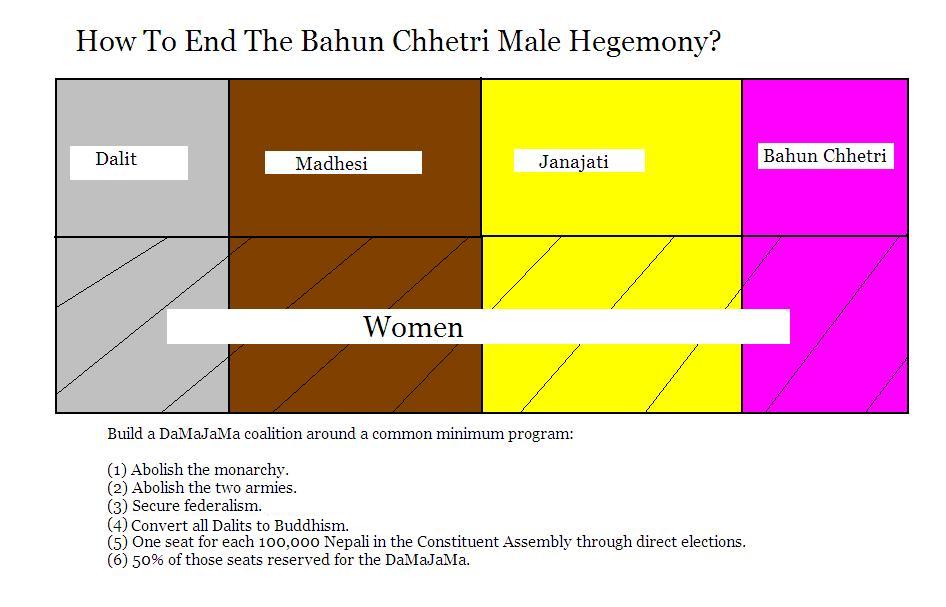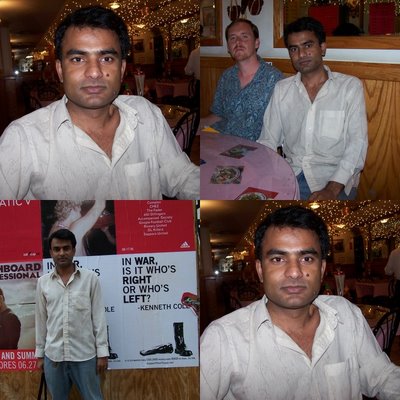
Madhesis, Social Justice, And The DaMaJaMa Equation In Nepal
(sent off to Anu Anand at BBC and to The Kathmandu Post)
The April Revolution in Nepal was a major milestone, but all the problems in social justice and poverty and even democracy itself still remain. The revolution has merely earned the people the tools with which to address those problems.
The Madhesis are part of the DaMaJaMa equation, namely Dalit, Madhesi, Janajati, Mahila. Dalits are the traditionally untouchables in the Hindu caste system. The Janajati are neither Bahun, nor Chhetri, the two ruling castes in Nepal. They have last names like Sherpa, Tamang, Magar, Gurung, Rai, Limbu, Tharu, among others. The Madhesis are the people in the southern plains who often bear the brunt of the strong anti-India sentiments among the ruling class in Nepal. They speak languages like Maithili, Bhojpuri, Awadhi, Tharu, Urdu, and their link language is Hindi. Mahila is the Nepali word for women. Together these groups are close to 90% of the country. Bahun Chhetri men are an utter minority but hold most of the power.
Some say the Madhesis are half the country. Others say maybe 40%. Still others put the figure closer to 35%. But then there is some overlap. There are some people who are both Dalit and Madhesi, some who are both Janajati and Madhesi, like the Tharu.
The political plight of the Madhesi in Nepal is curious and can be compared to that of the Tamils in Sri Lanka, the Hindus in Pakistan and Bangladesh, the Muslims in India, and the ethnic Nepalis in southern Bhutan. Madhesis are close to half the country, and contribute to 70% of the state revenue, but are less than 5% of the political power in terms of their share in the police, the army, the bureaucracy, and political offices, and get only 20% of the state expenditures, most of it going to pay for the salaries of the Pahadi bureaucrats who happen to be stationed in the Terai, the sounthern plains. Pahadi is the term for the hill people.
On June 17, 2006, many of the Madhesis in New York City got together to discuss and organize around the theme of Madhesi empowerment.
There is a major issue with the Hindi language that is at the core of the Madhesi identity. Although few Madhesis speak Hindi as their first language, it is Hindi that links them all. A lot of Pahadis also understand Hindi, or they would not be watching Amitabh Bachchan on the big screen. Hindi is destined to become the sixth UN language down the line, on par with English. And as India's economic power grows, Hindi might as well become a major language of higher education and commerce.
Hindi has to be put on par with Nepali in Nepal. Like Nepali is the link language in the hills, Hindi is the link language in the southern plains.
Federalism is another issue. The country has to be divided into so many states with their own regional parliaments. Some want three states, some want five, some want eight. Some want the demarcation to be haphazard and geograhical, others want it drawn along ethnic lines.
Abolishing the monarchy is tied to the question. The monarchy represents the ruling elites, the Bahun Chhetri. That has also been true of the army. If Costa Rica can do without an army, perhaps Nepal should as well. Why not instead have more teachers and health care workers?
There is bound to be some major contention in the run up to the constituent assembly elections that will draw up a new constitution for the country. One proposal is to have one constituency for every 100,000 Nepali, and then reserve some of those seats for the DaMaJaMa. Elections would still be direct in those seats, but only individuals from particular backgrounds may contest. It is such a reserved seat that gave India Ram Vilas Paswan, a Dalit who is a major national figure today.
Having seats of roughly equal population has been another issue of contention for the Madhesis. In the 1990s, the Terai had only 80 of the 205 seats, although it deserved 103, going by population.
But the biggest issue of all is that of citizenship certificates. Of the 13 million Madheis in Nepal, close to half have been denied citizenship certificates. The government's official figure says four million, but it might be closer to six million. Without that certicicate, you can not buy or sell land, you can not apply for government jobs, you can not apply to colleges and universities. You can not even get birth or death certificates.
So you have a situation in Nepal where half the Madhesis get treated as non citizens, the other half as second class citizens.
The Madhesis have the numbers, but not yet the political consciousness that would earn them their equality in Nepal. The Dalits, the Janajati and the women have umbrella organizations, the Madhesis do not have one yet. There is no well articulated common minimum program. There are Madhesis in all the major political parties, but there is no Madhesi Caucus in the parliament. Like the blacks in America more than half a century ago, the Madhesis in Nepal will simply have to march, and do so in large numbers.
And the best way to cover much ground might be to strive to forge a strong coalition with the other three marginalized groups, to form a DaMaJaMa coalition. There is a need for a second revolution in Nepal, a social justice revolution.
In The News
Madhesi community in NY to work for Madhesis of Nepal NepalNews
Finland assures necessary help to Nepal; DPM Oli holds bi-lateral meetings
Bhutanese refugee stalemate: No end in sight
World Refugee Day being observed; UNHCR unhappy with Nepal
WFP starts emergency food deliveries in western Nepal
Annan extends full suport towards democratic forces in Nepal
Maoists abduct former DDC member Maoists abducted former member of Nawalaparasi District Development Committee from Parasi bazaar on Monday evening. .... Balawanta Yadav of the Ramgram Municipality was taken away from the programme venue of the first district conference of the Maoist aligned Madhesi National Liberation Front...... According to Maoists, they took Yadav under control for investigation in the charge of embezzling DDC fund.... He was appointed as DDC member by the erstwhile royal government.....
Maoist capture Parbat DDC: Report the Maoists have 'appointed' the vice-chairman of their people's government as acting DDC president and seated him in the DDC office of Parbat ..... The Maoists have claimed they did so due to their exclusion from DDC meetings and from budgetary decisions, as well as the lack of recognition of the Maoists as a political party ..... The Maoists have claimed the new president was appointed on the basis of "people's power". The rebels have ordered DDC officials to accept the decision......
`Forest mafia’ having a field day in Banke the lax law and order situation in the aftermath of the restoration of democracy ...... the District Forest Office of Banke had granted permission to fell trees worth Rs 284.22 million over the last three months. But the trees that were felled down during this period were worth more than three times....... the local Maoist leaders allowed felling off of trees after collecting 40 percent ‘tax’ that would go into their party coffers...... smuggling of timber was rampant in the past since security personnel did not venture into jungles due to Maoist threats..... Officials at the Ministry of Forest and Soil Conservation in Kathmandu told Nepalnews that they suspended two Rangers posted at the District Forest Office, Banke-- Sushil Mandal and Ram Ganesh Shah—on charges of assisting ‘forest mafia’ to smuggle trees in connivance with the Maoists. The decision was taken after a joint secretary level team from the Ministry conducted on-the-spot study to find out the truth. ....... Nepal has the history of forest resources turning first target during the time of political transition as seen in 1979-80, 1989-90 and 2005-06.
Price of milk increases
Visitors
Page views yesterday 294
| 1. | 07:42 | T-Online, Germany | |
| 2. | 07:50 | ClearBlue Technologies, United States | |
| 3. | 07:51 | Comcast Communications, United States | |
| 4. | 07:52 | Comcast Communications, United States | |
| 5. | 07:59 | National Internet Backbone, India | |
| 6. | 08:01 | ClearBlue Technologies, United States | |
| 7. | 08:04 | Great Works Internet, United States | |
| 8. | 08:05 | ClearBlue Technologies, United States | |
| 9. | 08:21 | Satyam Infoway Limited, India | |
| 10. | 08:35 | Satyam Infoway Limited, India | |
| 11. | 08:38 | Satyam Infoway Limited, India | |
| 12. | 08:40 | Wipro NET Ltd., India | |
| 13. | 08:42 | Optimum Online, United States | |
| 14. | 08:44 | Optimum Online, United States | |
| 15. | 08:49 | Optimum Online, United States | |
| 16. | 08:50 | Optimum Online, United States | |
| 17. | 08:52 | McGill University, Canada | |
| 18. | 08:53 | Bharti British Telecom Internet Limited, India | |
| 19. | 08:54 | Bharti British Telecom Internet Limited, India | |
| 20. | 08:55 | National Internet Backbone, India | |
| 21. | 09:01 | British Telecommunications plc, United Kingdom | |
| 22. | 09:06 | Verizon Online, United States | |
| 23. | 09:14 | Bharti British Telecom Internet Limited, India | |
| 24. | 09:18 | Universite de Haute Bretagne, Rennes, France | |
| 25. | 09:29 | Universite de Haute Bretagne, Rennes, France | |
| 26. | 09:47 | TELUS Internet Services, Canada | |
| 27. | 09:48 | Internap Network Services Corporation, United States | |
| 28. | 09:52 | Owtanet Ltd., Clifton, United Kingdom | |
| 29. | 09:52 | Covad Communications, United States | |
| 30. | 09:56 | Local Internet Service Company, United States | |
| 31. | 09:56 | Owtanet Ltd., Clifton, United Kingdom | |
| 32. | 10:05 | Owtanet Ltd., Clifton, United Kingdom | |
| 33. | 10:12 | University of Bergen (UoB), Bergen, Norway | |
| 34. | 10:21 | Hogeschool Larenstein, Velp, Netherlands, The | |
| 35. | 10:21 | Bharat Sanchar Nigam Ltd., India | |
| 36. | 10:29 | Optimum Online, United States | |
| 37. | 10:31 | Optimum Online, United States | |
| 38. | 10:31 | Internet For Learning, United Kingdom | |
| 39. | 10:31 | State of South Carolina, United States | |
| 40. | 10:31 | United States Army, Jackson, United States | |
| 41. | 10:36 | Optimum Online, United States | |
| 42. | 10:37 | Comcast Communications, United States | |
| 43. | 10:38 | Optimum Online, United States | |
| 44. | 10:47 | Optimum Online, United States | |
| 45. | 10:51 | Verizon Online, United States | |
| 46. | 11:04 | Optimum Online, United States | |
| 47. | 11:04 | SAVVIS Communications Corporation, United States | |
| 48. | 11:08 | Texas Christian University, Fort Worth, United States | |
| 49. | 11:32 | Smart Telecom Holdings, Ireland | |
| 50. | 11:35 | University of Missouri, Columbia, United States |
Legal news from nepal
be first to knowTuesday, June 13, 2006
Nepalese lawyer louds UN role
Advocate Dinesh Tripathi on the Convention "Nepal Today." organised in United Nations Association said that King force to step-down under the historic, courageous movement of Nepali people. Nepali people have shown tremendous courage and brevity against ruthless, authoritarian and military regime of the king. April revolution of Nepal is set an example in the contemporary world. April evolution of Nepal established the example that people are ultimate master of their own fate and bold and courageous step of people could transform the society and topple down even well organized military regime. Historic changes are taking place in Nepal currently. But Nepal's journey toward full and complete democracy is not the free of risk and challenges. There is whole lot of risk and challenges are ahead.
He told futher that Nepal's democratization process is full of risk and obstacle. King is down but he is not out. Military is still not under civilian control. No credible peace process is started yet. Nation has long way to go to establish full and genuine democracy and ensure a socio economic justice for vast majority of people. Nepal has to chart a new course of the history to implement the mandate and aspiration of April Revolution. People are aspiring a polity based on human rights, rule of law and democratic republication. People want be full sovereign and want to make new Constitution by themselves and for themselves.
World community must give its active support to democratization process of Nepal. UN System has bigger role to play in this context. UN should actively and creatively engage in the Nepal 's democracy building and peace process. UN should facilitate credible peace process and provide its expertise and resources to build sustainable peace and democratic institution in Nepal. UN 's role could be important in this context. UN has resources and credibility. Under the UN charter member states are agreed to respect human rights and fundamental freedoms. At this point Nepal needs huge humanitarian operation too.
Nepal must immediately ratified Rome statute of International Criminal court. ICC could be the most effective tool to end impunity and conduct free and impartial trial. Perpetrator must be held accountable and must be punished for their misdeeds. Un should also exert pressure to the Nepali government to ratify to ICC convention otherwise it should consider creating a special tribunal for Nepal to conduct fair trial. Now both the party should abide by the norms of international human rights and Geneva Convention. UN should closely monitor the behavior of both parties. No one should allow violating the code of conduct and disrupting the peace process. This is the defining moment in our history but our democratization process is still very weak and fragile. Failure of successful management of peace and democratic transition in Nepal will lead toward the total disaster. It will also create a huge problem of regional peace and security. It will have a big regional implication. So stakes are very high and world community should creatively and actively engage in the Nepal 's democratic peace building process and extend helping hand.

























